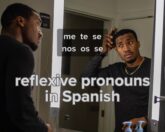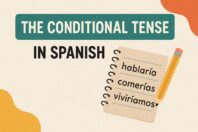Spanish Verbs: Stop Confusing Ver vs Mirar

Get our free email course, Shortcut to Conversational.
Have conversations faster, understand people when they speak fast, and other tested tips to learn faster.
More infoIn Spanish, there are a couple of verbs that always seem to catch beginners students out, especially when translating directly from English. The most common example of this is Ser vs Estar, which both mean “to be” (read a full post on that here). A less common, but still somewhat confusing pair is Ver vs Mirar and in this post, we will explain exactly how to avoid confusing them again.
Let’s quickly review what both verbs mean in English:
- Ver = to see
- Mirar = to look or watch
As you can tell, both verbs quite different, although, in English, we tend to use them interchangeably.
Spanish Grammar: Mastering The Verb Ver
Ver is an irregular verb, and is the equivalent of “to see” in English.
It is used in pretty much the exact same way, with the addition of a few extra scenarios.
Below is are the most common conjugations of ver.
| Personal Pronoun | Simple Present
(See / Sees) |
Simple past
(Saw) |
Future
(I will see) |
Imperfect past
(Used to see) |
| Yo | Veo | Ví | Veré | Veía |
| Tú | Ves | Viste | Verás | Veías |
| Usted | Ve | Vió | Verá | Veía |
| Él / Ella | Ve | Vió | Verá | Veía |
| Nosotros / Nosotras | Vemos | Vimos | Veremos | Veíamos |
| Ustedes | Ven | Vieron | Verán | Veían |
| Ellos / Ellas | Ven | Vieron | Verán | Veían |
Now it’s time to cover the most common scenarios in which ver can be used.
1) To see people or animals
- I saw your mother yesterday at the market – Vi a tu madre ayer en el mercado
- Every day I see my neighbor walking with his dog – Todos los días veo a mi vecino caminar con su perro
- Yesterday I saw your cat on my roof – Ayer vi a tu gato en mi techo
2) To watch or see – TV, movies, plays, and sports
This is one scenario which tends to catch most beginners out. If you are thinking in English, then it makes sense to use mirar in this scenario.
However, when talking about watching something (be it on TV, in a theater or a sports event), we need to use to verb ver.
- Tomorrow I will see the movie that you recommended to me – Mañana veré la película que me recomendaste
- We are watching the baseball game – Estamos viendo el juego de baseball
- The children are watching TV now – Los niños están viendo TV ahora
- Last night we saw that play – Anoche vimos esa obra de teatro
3) To talk about visiting someone or a place
- I’m going to see my mother this afternoon at her house – Voy a ver a mi madre esta tarde en su casa
- Let’s see the new store – Vamos a ver la nueva tienda
- My friends came to see me – Mis amigos vinieron a verme
- See you later – Nos vemos mas tarde
4) To talk about a possible result
- I’ll see what happens – Ya veré que pasa
- I gave him the report to see what he thinks – Le di el informe a ver que piensa
- You will see what decision you need to take – Tú verás qué decisión necesitas tomar
5) Use Ver to indicate an understanding
- I don’t see the difference – No veo la diferencia
- We didn’t see the mistake – Nosotros no vimos el error
- Now I see what you are trying to explain – Ahora veo lo que intentas explicar
6) How does it look?
- Do you like how this dress looks on me? – ¿Te gusta como se me ve este vestido?
- How does the wound look? – ¿Cómo se ve la herida?
- I got a new haircut, how does it looks? – Tengo un nuevo corte de cabello, ¿cómo se ve?
Spanish Grammar: How And When To Use Mirar
Mirar is a regular verb, and is the equivalent of “to look” or “to watch” in English.
The main difference between Spanish and English is that mirar is used when you consciously fix your eyes and attention on one thing at a time.
Mirar is also used as a way to ask someone to “check out” what is going on.
Before we cover specific scenarios, let’s review the most common conjugations of this verb.
| Personal Pronoun | Simple Present
(Look / Looks) |
Simple past
(Looked) |
Future
(I will look) |
Imperfect past
(Used to look) |
| Yo | Miro | Miré | Miraré | Miraba |
| Tú | Miras | Miraste | Mirarás | Mirabas |
| Usted | Mira | Miró | Mirará | Miraba |
| Él / Ella | Mira | Miró | Mirará | Miraba |
| Nosotros / Nosotras | Miramos | Miramos | Miraremos | Mirábamos |
| Ustedes | Miran | Miraron | Mirarán | Miraban |
| Ellos / Ellas | Miran | Miraron | Mirarán | Miraban |
There are two specific scenarios where mirar is always used.
1) To pay attention to something or someone
- My sister likes to watch the birds in the trees – A mi hermana le gusta mirar los pájaros en el árbol
- Look at that car! – ¡Mira ese auto!
- Look how I do it, and then try to do the same – Mira como lo hago yo, y luego intenta hacer lo mismo
2) To ask for attention at a situation
- Look what is happening – Mira lo que está sucediendo
- Look at this, what do you think? – Mira esto, ¿Qué piensas?
- In the meeting we are going to look at sales this month – En la reunión vamos a mirar las ventas de este mes
Bonus Verbs: Parecer and Buscar
As we already mentioned, mirar is used as “to look” or “to watch”
However, this should not be confused with expressing “to look like” or “to look for”, which requires two different verbs.
The verb parecer is used when we want to express “look like” with regards to appearances, physical aspects or ideas that you have about something or someone.
On the other hand, we use the verb buscar in order to express “look for” with regards to searching or finding something or someone.
Below Spanish verbs parecer and buscar verbs conjugated in the simple present tense.
| Personal Pronoun | Look Like
(Simple Present) |
English equivalent | Look for (Simple Present) | English equivalent |
| Yo | Parezco | I look like | Busco | I look for |
| Tú | Pareces | You look like | Buscas | You look for |
| Usted | Parece | You look like | Busca | You look for |
| Él / Ella | Parece | He / She looks like | Busca | He / She looks for |
| Nosotros / Nosotras | Parecemos | We look like | Buscamos | We look for |
| Ustedes | Parecen | You look like | Buscan | You look for |
| Ellos / Ellas | Parecen | They look like | Buscan | They look for |
Examples:
- It looks like he is not coming – Parece que el no viene
- We are looking for a restaurant to eat – Estamos buscando un restaurante para comer
- He looks like his father – Se parece a su padre
- They are looking for you – Ellos te están buscando
- What are you looking for? – ¿Qué estás buscando?
Ver v Mirar: Exercises
Now it’s time to test your knowledge of Ver vs Mirar.
(scroll below for answers)
A) Select the right personal pronoun for every sentence
- Ví a tu novio ayer en el cine ( Yo – Ella – Nosotros)
- Miramos las estrellas toda la noche ( Ustedes – Ellos – Nosotros)
- Fueron a ver la nueva película (Nosotras – Ellas – Tú)
B) Fill the blank space with the right conjugation of VER
- Ellos ____ televisión toda la noche
- Nosotros ya ____ el nuevo horario de clases
- ¿____ el vestido que está usando Ana?
C) Fill the blank space with the right conjugation of MIRAR
- No puedes _____ hasta que yo lo diga
- Ellos se _____ a los ojos con amor
- Nosotros ______ el anochecer en la montaña
D) Fill the blank space with the right conjugation of VER or MIRAR
- Yo ____ cuando tu me _____ en clases
- Anoche nosotros _____ la última temporada de Game of Thrones
- _____ el desastre que hiciste
E) Tell what sentences are correct or incorrect, correct if it’s needed
- Ella no pudo miró los errores
- ¿No ves que ellos te están engañando?
- Tu verá lo que está sucediendo ahora
- Vamos a ver los regalos
Answers
A) Select the right personal pronoun for every sentence
- Ví a tu novio ayer en el cine ( Yo – Ella – Nosotros)
- Miramos las estrellas toda la noche ( Ustedes – Ellos – Nosotros)
- Fueron a ver la nueva película (Nosotras – Ellas – Tú)
B) Fill the blank space with the right conjugation of VER
- Ellos vieron televisión toda la noche
- Nosotros ya vimos el nuevo horario de clases
- ¿Viste el vestido que está usando Ana?
C) Fill the blank space with the right conjugation of MIRAR
- No puedes mirar hasta que yo lo diga
- Ellos se miraron a los ojos con amor
- Nosotros miramos el anochecer en la montaña
D) Fill the blank space with the right conjugation of VER or MIRAR
- Yo veo cuando tu me miras en clases
- Anoche nosotros vimos la última temporada de Game of Thrones
- Mira el desastre que hiciste
E) Tell what sentences are correct or incorrect, correct if it’s needed
- Ella no pudo mirar los errores
- ¿No ves que ellos te están engañando? (Correct)
- Tu ves lo que está sucediendo ahora
- Vamos a ver los regalos (Correct)


